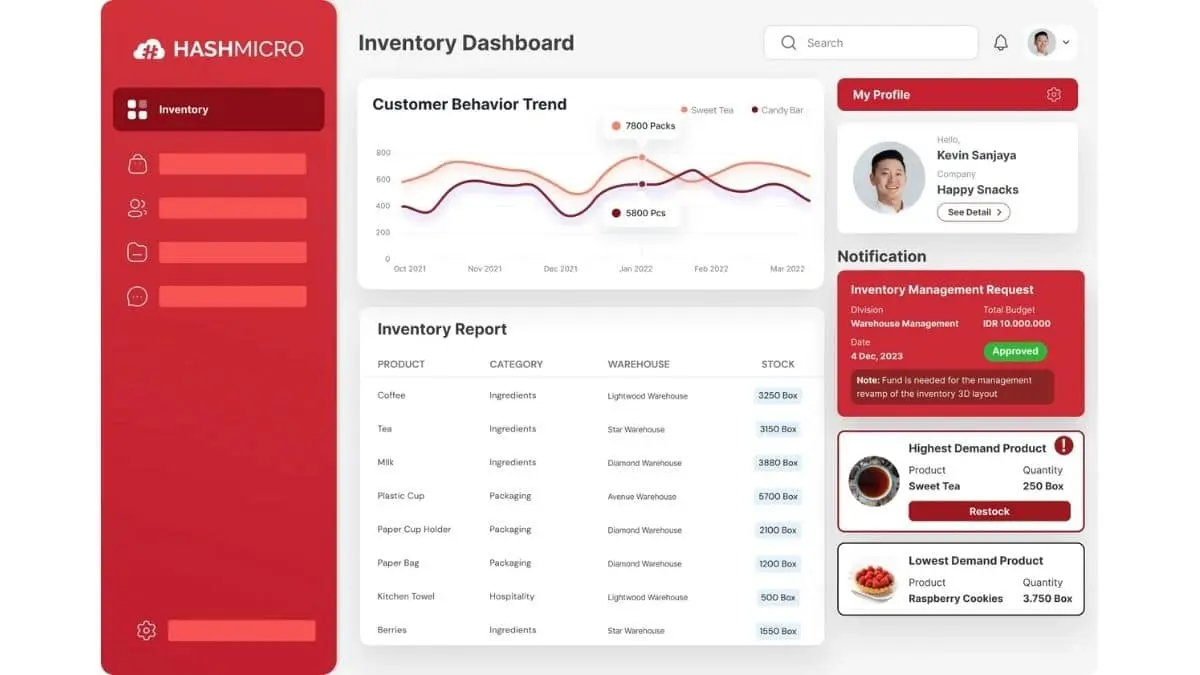Kamusta fellow entrepreneur! Have you ever felt frustrated by stock shortages, overstocking, or missed sales due to inventory errors? Not automating your inventory cycle can lead to these common problems, causing disruptions in operations, inaccurate data, and increased costs.
However, by taking control of your stock, you can prevent these costly issues. One effective way to do this is by doing an inventory cycle count. This strategic approach to managing stock efficiently without halting operations. By continuing to read this article, you will discover how this can elevate your business, so read on!
Key Takeaways
|
Table of Contents

What is Inventory Cycle Count?
Cycle counting is a targeted process where a subset of inventory is counted on a scheduled day. This method allows Filipino businesses to regularly verify inventory accuracy without shutting down operations, unlike full physical inventories.
Cycle counts are scheduled throughout the year, ensuring that all items are verified multiple times. This process helps maintain accurate inventory records and enables quicker identification of discrepancies, which is crucial for meeting customer demands in the Philippines.
Through cycle counting, companies can enhance inventory management and improve stock data accuracy, supporting better financial reporting and decision-making, essential for long-term business success.
Read More: Top Construction Inventory Management Software
Advantages of Inventory Cycle Counting
Inventory cycle counts offer several key advantages that can significantly improve warehouse management and operational efficiency for Filipino businesses. By regularly implementing this method, businesses can maintain better control over their stock and processes.
Here are the main benefits of inventory counting:
- Non-Disruptive to Operations: Cycle counts verify stock without interrupting daily warehouse operations, ensuring productivity while maintaining accuracy.
- Greater Flexibility: Cycle counts offer flexibility in scheduling, aligning with your warehouse’s workflow, unlike traditional inventory audits that often disrupt operations.
- Increased Accuracy: Regular cycle counts identify and correct errors promptly, helping to maintain high levels of inventory accuracy over time.
- Early Detection of Issues: By conducting frequent cycle counts, businesses can detect problems like theft or misplacements early, allowing for immediate corrective actions.
- Better Data for Decision Making: Reliable data from regular cycle counts supports better forecasting, purchasing decisions, and overall inventory optimization.
This approach ultimately helps to optimize performance and boost profitability. Don’t forget that the Bureau of Internal Revenue (BIR) requires an inventory list submission. Ensure your receipts and invoices comply with the inventory list BIR regulations.
Physical Count vs Cycle Count
| Feature | Physical Count | Cycle Count |
|---|---|---|
| Frequency | Annually or semi-annually | Monthly or quarterly |
| Disruption | High; halts operations | Low; minimal disruption |
| Scope | Entire inventory | Specific parts of inventory |
| Accuracy | Snapshot; quickly outdated | Ongoing accuracy |
| Error Handling | Post-count corrections | Immediate corrections |
| Resource Allocation | More staff and time | Utilizes existing staff |
| Strategic Value | Infrequent insights | Continuous insights |
Types of Inventory Cycle Count Methods
There are various cycle count methods that cater to different business needs, and Filipino businesses can benefit from choosing the one that best fits their operations. Here are some of the most common methods:
- Control Group Counting: Involves frequently counting a fixed set of items, helping to identify and address systemic errors in the inventory process.
- ABC Analysis: Categorizes inventory into classes (A, B, C) based on their value. High-value items (Class A) are counted more frequently to ensure accuracy.
- Random Sample Counting: Selects items at random for counting, providing an overall view of inventory accuracy without focusing on specific categories.
- Cycle Counting by Usage: Prioritizes items based on their usage rate, with frequently used stock being counted more often to prevent shortages.
- Hybrid Method: Combines elements of other methods to create a tailored approach that suits specific business requirements.
Choosing the right cycle count method helps businesses maintain accurate lean inventory, reduce errors, and optimize their stock management processes efficiently.
Best Practices for Inventory Cycle Count
To ensure a successful implementation of inventory cycle counting, Filipino businesses should follow these best practices to optimize their inventory management. Here are the key practices to consider:
- Regularly Schedule Counts: Maintain a consistent schedule for cycle counting to prevent inaccuracies and ensure up-to-date inventory reports.
- Train Your Staff: Well-trained staff are crucial for maintaining accuracy and identifying discrepancies in the counting process.
- Use Standardized Processes: Implementing standardized forms and procedures ensures consistency and reliability in data collection.
- Prioritize High-Value Items: High-value or fast-moving items should be counted more frequently to avoid potential shortages or inaccuracies.
- Adopt Inventory Management Software: Automate the process with advanced software to provide real-time updates and minimize manual errors.
- Review and Adjust: Regularly evaluate the counting process to address any recurring discrepancies and improve efficiency.
By following these best practices and implementing other related software, businesses can maintain accurate inventory records, enhance operational efficiency, and make informed decisions that benefit their bottom line.
Automate Inventory Cycle Counting with HashMicro
HashMicro offers an inventory management solution tailored to automate cycle counting for Filipino businesses. It incorporates advanced features, enhancing stock management. Consequently, this boosts accuracy and efficiency in inventory control.
Here are the features of our software:
- RFID Warehouse Rack Stock In-Out Automation: Provides real-time inventory updates, facilitating continuous cycle counting and minimizing disruptions to operations by automatically tracking stock movements.
- Packaging Management and Fast Moving Slow Moving Stocks Analysis: Automates the identification and counting of stock based on packaging types and sales velocity, reducing manual effort and enhancing accuracy in cycle counts.
- Run Rate Reordering Rules and Stock Reservations & Reporting: Enables businesses to customize cycle counting schedules and stock management strategies based on usage rates and operational demands, ensuring inventory accuracy.
- Quality Control Management and Error Detection: Integrates error detection capabilities within the inventory cycle, identifying and addressing discrepancies immediately to maintain consistent stock accuracy.
- Advanced Reporting and Analytics with Stock Aging Report: Generates comprehensive reports from cycle counts, offering detailed insights into inventory status and aging, supporting informed decision-making and optimization efforts
With these features, HashMicro’s software, along with other software solutions, enhances the cycle counting process, improving overall inventory accuracy and helping Filipino businesses achieve smoother, more efficient operations. Take advantage of the free demo to see how HashMicro can elevate your inventory management.
Conclusion
Inventory discrepancies can be a significant challenge for Filipino businesses, but adopting cycle counting offers an effective solution. By using this method, businesses improve inventory accuracy, optimize operations, and make better decisions.
Additionally, automating the cycle counting process with HashMicro software enhances efficiency and minimizes errors. Features like real-time updates and automated stock counting streamline operations. Try HashMicro’s free demo today to see how it can transform your inventory management and boost business efficiency!
Frequently Asked Questions
-
What is meant by cycle count?
Cycle count is a stock management method that regularly counts a portion of inventory, avoiding the need for a full shutdown. This approach ensures continuous accuracy. Moreover, it assists businesses in maintaining current inventory records, promoting seamless operations.
-
How often should cycle count?
Cycle counts should be tailored to business needs, occurring typically monthly or quarterly. High-value or frequently used items might need more frequent assessments. This strategy preserves accuracy and boosts inventory management effectiveness.
-
How accurate is cycle count?
Cycle counts are highly accurate when performed regularly and systematically. They provide more consistent inventory accuracy compared to annual physical counts, as errors are identified and corrected promptly.





















